Unit 6 Do you like bananas?Section A Grammar Focus-3c 课件 (共25张PPT)
文档属性
| 名称 | Unit 6 Do you like bananas?Section A Grammar Focus-3c 课件 (共25张PPT) |  | |
| 格式 | pptx | ||
| 文件大小 | 3.7MB | ||
| 资源类型 | 教案 | ||
| 版本资源 | 人教新目标(Go for it)版 | ||
| 科目 | 英语 | ||
| 更新时间 | 2023-08-21 08:08:56 | ||
图片预览

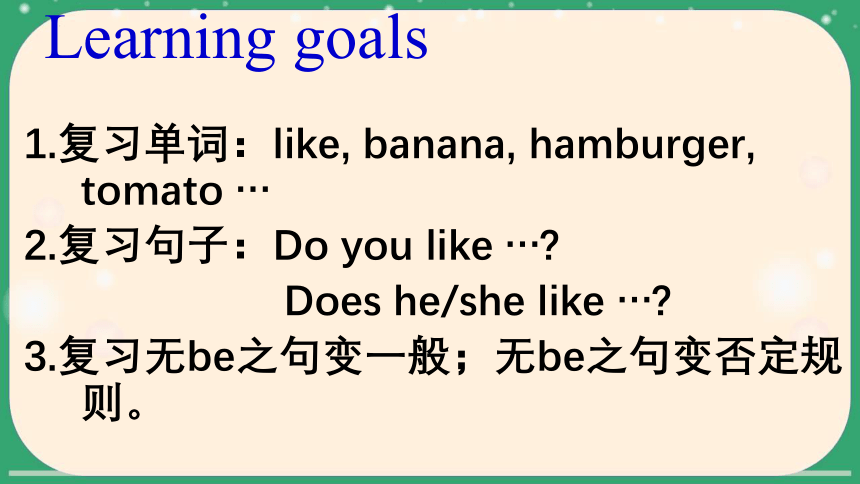
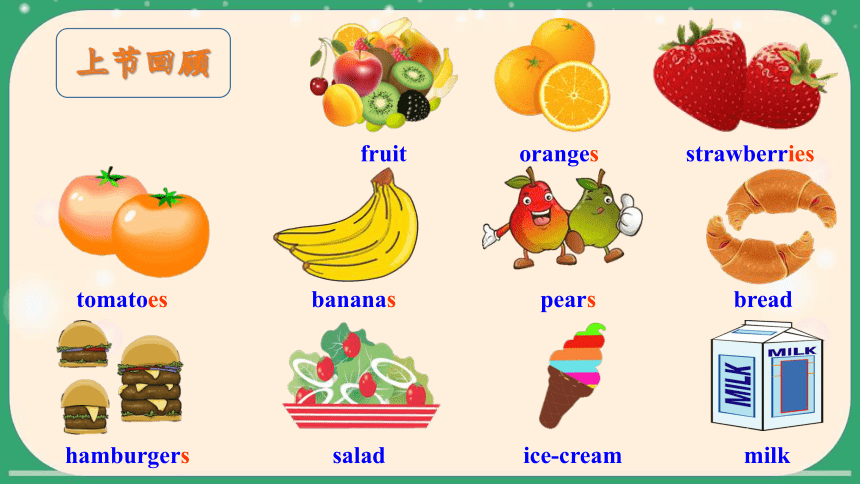
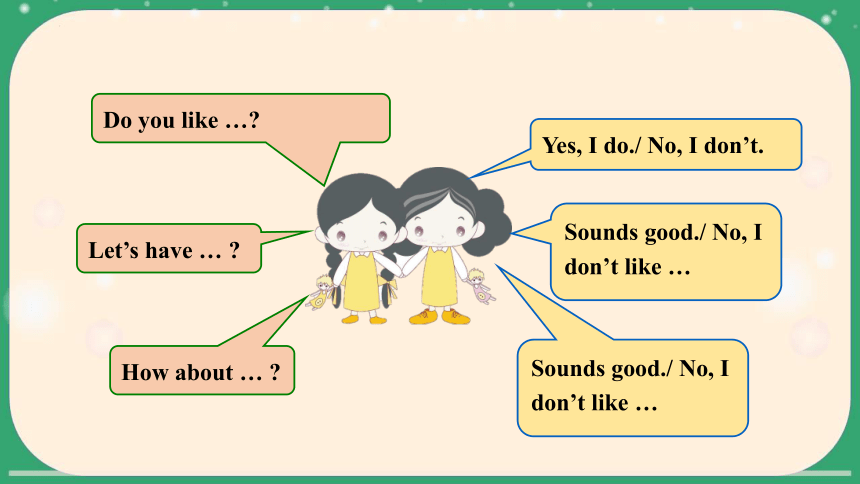
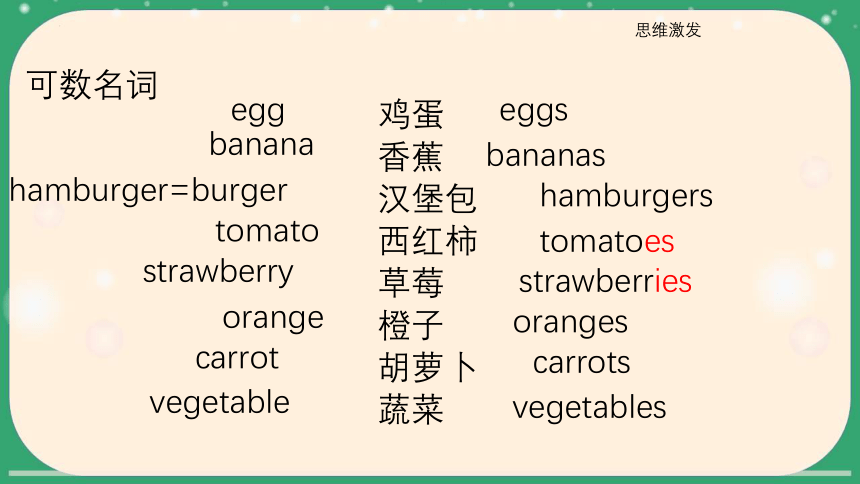
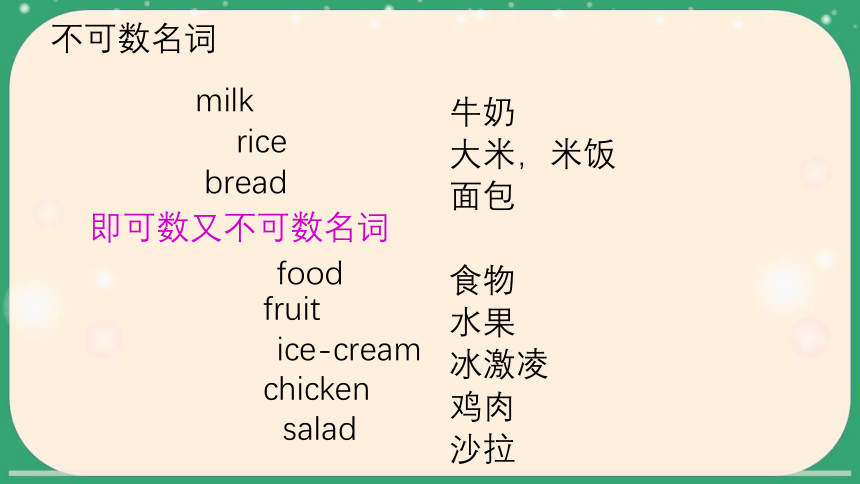
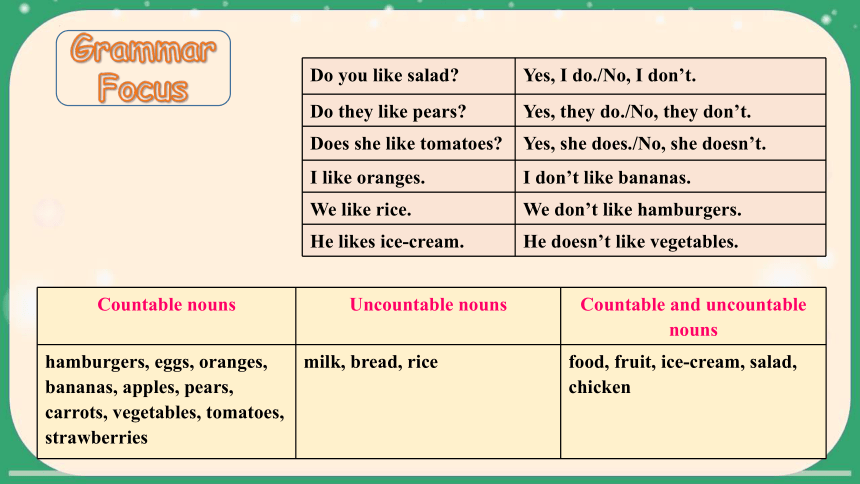
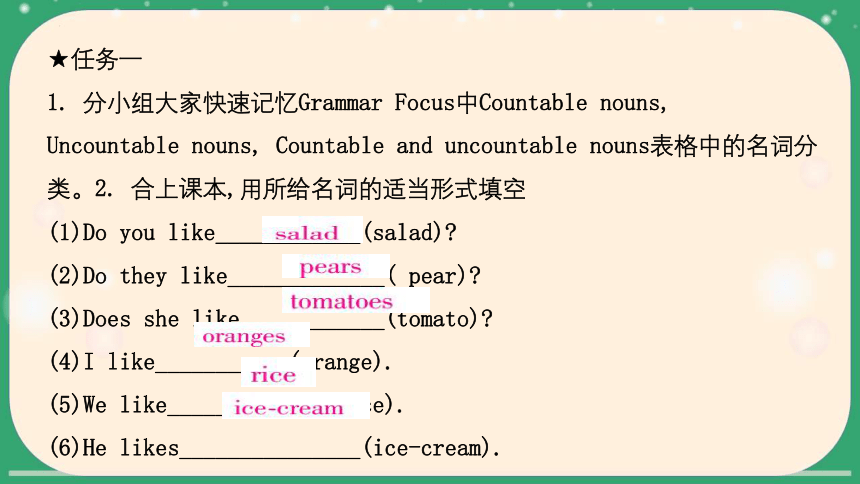
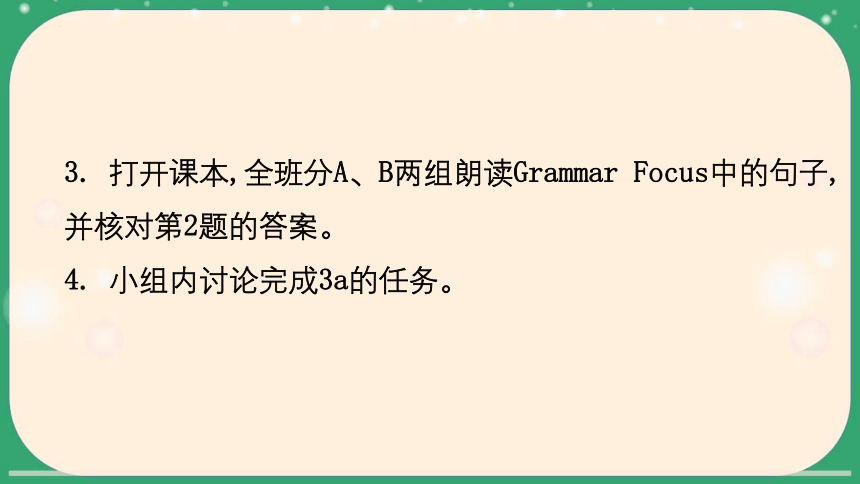
文档简介
(共25张PPT)
Section A (Grammar Focus-3c)
Unit 6 Do you like bananas
Learning goals
1.复习单词:like, banana, hamburger, tomato …
2.复习句子:Do you like …
Does he/she like …
3.复习无be之句变一般;无be之句变否定规则。
上节回顾
fruit
tomatoes
oranges
strawberries
pears
bananas
bread
hamburgers
salad
milk
ice-cream
Do you like …
Yes, I do./ No, I don’t.
Let’s have …
Sounds good./ No, I don’t like …
How about …
Sounds good./ No, I don’t like …
鸡蛋
香蕉
汉堡包
西红柿
草莓
橙子
胡萝卜
蔬菜
egg
banana
hamburger=burger
tomato
strawberry
orange
carrot
vegetable
eggs
bananas
hamburgers
tomatoes
strawberries
oranges
carrots
vegetables
思维激发
可数名词
牛奶
大米,米饭
面包
食物
水果
冰激凌
鸡肉
沙拉
milk
rice
bread
food
fruit
ice-cream
chicken
即可数又不可数名词
salad
不可数名词
Grammar Focus
Do you like salad Yes, I do./No, I don’t.
Do they like pears Yes, they do./No, they don’t.
Does she like tomatoes Yes, she does./No, she doesn’t.
I like oranges. I don’t like bananas.
We like rice. We don’t like hamburgers.
He likes ice-cream. He doesn’t like vegetables.
Countable nouns Uncountable nouns Countable and uncountable nouns
hamburgers, eggs, oranges, bananas, apples, pears, carrots, vegetables, tomatoes, strawberries milk, bread, rice food, fruit, ice-cream, salad, chicken
★任务一
1. 分小组大家快速记忆Grammar Focus中Countable nouns,
Uncountable nouns, Countable and uncountable nouns表格中的名词分类。2. 合上课本,用所给名词的适当形式填空
(1)Do you like____________(salad)
(2)Do they like_____________( pear)
(3)Does she like____________(tomato)
(4)I like___________(orange).
(5)We like_____________(rice).
(6)He likes_______________(ice-cream).
3. 打开课本,全班分A、B两组朗读Grammar Focus中的句子,并核对第2题的答案。
4. 小组内讨论完成3a的任务。
一、动词like在一般现在时中的用法
like意为“喜欢”,用于一般现在时中有两种形式:like和likes。当主语为第三人称单数时用likes,其他人称则用like。如:
I like ice -cream. 我喜欢冰淇淋。
She likes English. 她喜欢英语。
变成否定句或一般疑问句时,要借助于助动词do/does,但likes必须恢复成原形。如:
She doesn’t like English. 她不喜欢英语。
—Does she like English 她喜欢英语吗?
—Yes, she does./ No, she doesn’t. 是的,她喜欢。/
不,她不喜欢。
【拓展】特殊疑问句
What does she like?
她喜欢什么?
Language Points
二、名词的数
1. 可数名词
可以计数的名词叫可数名词。可数名词一般有单数和复数两种形式。
可数名词复数形式的规则变化:
类别 构成方法 示例
一般情况 加-s bed—beds
以s, x, ch, sh等结尾的词 加-es box—boxes watch—watches
以辅音字母加y结尾的词 变y为i再加-es strawberry—strawberries
以f, fe结尾的词 变f, fe为v再加-es leaf—leaves
直接加-s roof—roofs
以o结尾的词 加-es tomato—tomatoes
加-s photo—photos
以 o结尾的名词变复数加 -es的有:英雄(hero)爱吃西红柿(tomato)和土豆(potato)
Language Points
2. 不可数名词
在英语中,有些名词不能用具体的数目计算,我们称其为不可数名词,如:rice,milk,meat,bread等。不能在前面直接加数词或a/an,也不能在词尾加- s或- es,但some和any可直接放在其前面。如:
some bread 一些面包
some rice 一些米饭
chicken n. 鸡肉 (不可数)
鸡 (可数)
3. 某些名词既是可数名词,又是不可数名词,但有时意义不同。如:
Language Points
3a
1. I like fruit, but I (don’t / doesn’t) like vegetables.
2. She (like / likes) bread, but she (doesn’t / don’t) like salad.
3. He (like / likes) bananas, but he (don’t / doesn’t) like oranges.
4. We (likes / like) hamburgers, but we don’t (like / likes) chicken.
5. They (likes / like) pears, but they (don’t / doesn’t) like strawberries.
Underline the correct words in the brackets.
but前面是肯定描述
but后面是否定描述
I like fruit, but I don’t like vegetables.
She likes bread, but she doesn’t like salad.
Structure:… like/ likes…, but… don’t / doesn’t like…
请谈论一下你自己熟悉的人,除了谈论他们对食物的喜好,还可以谈论对其他事物的喜好, 如:科目、季节、颜色、运动等。
Pair work
3b
Number these sentences [1-4] to make a conversation.
A: Do you like salad
B: Yes, I do.
A: So, let’s get salad.
B: OK.
So, let’s get salad. Yes, I do. Do you like salad OK.
3
2
1
4
So what are you going to do next
那么接下来你要做什么?
so作连词,在句中表示“那么”,位于句首用于引出评论或问题。
A: Do you like …
B: Yes, I do.
A: So, let’s get …
B: OK.
Make your own conversations with your partners.
3c
Ask your classmates about the food in the chart. Find out what they like and don’t like.
Food Likes Doesn’t like
ice-cream Liu Li Zhao Jun
hamburgers
oranges
milk
salad
strawberries
tomatoes
bananas
★任务二
调查组内同学喜欢和不喜欢的食物,完成3c的表格,然后向全班同学汇报。汇报时可参照的语言:
I am from Group 1. My name is Linda. Tom and Lucy are my friends.Tom likes salad, but Lucy doesn’t like it. Tom likes ice-cream and Lucy likes ice-cream, too. That’s all.(注意名词的单复数形式)
Different people like different food. How about your classmates Interview at least three students about the food they like and dislike, and make a report.
Interview
Exercise
Ⅰ. 用所给单词的适当形式填空。
1. I like ____________(tomato) very much.
2. Nick ____________(like) hamburgers and salad.
3. Let’s ____________(think) about the birthday dinner.
4. Ms. Smith has ten ____________(strawberry)
5. Hamburgers That ____________(sound) good.
6. My brother ____________(not like) eggs.
7. His cousins ____________(not like) ice-cream.
tomatoes
likes
think
strawberries
sounds
doesn’t like
don’t like
Ⅱ. 根据汉语提示写单词。
1. Ms. Sun likes ____________(蔬菜) very much.
2. We always have ____________(晚饭) at 6:00.
3. Mary’s ____________(生日) party is next week.
4. Does your sister like ____________(鸡肉)
5. ____________(鸡蛋) and milk are good for you.
6. We have ____________(米饭) and ____________(胡萝卜).
vegetables
dinner
birthday
chicken
Eggs
rice
carrots
Ⅲ. 单项选择
1. Wu Ling likes pears but she ______ bananas.
A. likes B. don’t like C. doesn’t like
2. —______ your brother like hamburgers
—Yes, ______.
A. Do; they do B. Does; he does C. Are; they are
3. We don’t have ______. Let’s go and buy(买) some tomatoes and carrots.
A. vegetables B. food C. hamburger
4. Look! The chicken ______ on the table and the pears ______ in the bag.
A. is; is B. are; are C. is; are
5. —Let’s ______ some vegetable salad then.
—Sounds good.
A. like B. have C. find
C
B
A
C
B
Ⅳ. 句型转换
1. Mary likes fruit salad. (改为一般疑问句)
_______ Mary _______ fruit salad
2. They like bananas for dinner. (改为否定句)
They _______ _______ bananas for dinner.
3. —Does your sister like oranges (作否定回答)
—_______, _______ _______.
4. We have some fruit after dinner. (改为由let开头的祈使句)
_______ _______ some fruit after dinner.
5. Paul likes milk. He doesn’t like bread. (合为一句)
Paul likes milk, _______ he doesn’t like bread.
Does
don’t
No
Let’s
but
like
like
she
doesn’t
have
本节重点
like在一般现在时中的用法
第三人称单数
其他人称
He/She likes …
He/She doesn’t like …
Does he/she like …
I/We/They like …
I/We/They don’t like …
Do you/they like …
名词的数
可数
既可可数又可不可数
milk, bread, rice
ice-cream, salad, chicken, food, fruit
语法
不可数
banana, hamburger, tomato, strawberry, pear, apple
Homework
谈论你家人最喜爱的食物, 写一段小短文。
My name is … I like …, but I don’t like …
My father likes …, but he doesn’t like …
My mother likes …, but she doesn’t like …
Section A (Grammar Focus-3c)
Unit 6 Do you like bananas
Learning goals
1.复习单词:like, banana, hamburger, tomato …
2.复习句子:Do you like …
Does he/she like …
3.复习无be之句变一般;无be之句变否定规则。
上节回顾
fruit
tomatoes
oranges
strawberries
pears
bananas
bread
hamburgers
salad
milk
ice-cream
Do you like …
Yes, I do./ No, I don’t.
Let’s have …
Sounds good./ No, I don’t like …
How about …
Sounds good./ No, I don’t like …
鸡蛋
香蕉
汉堡包
西红柿
草莓
橙子
胡萝卜
蔬菜
egg
banana
hamburger=burger
tomato
strawberry
orange
carrot
vegetable
eggs
bananas
hamburgers
tomatoes
strawberries
oranges
carrots
vegetables
思维激发
可数名词
牛奶
大米,米饭
面包
食物
水果
冰激凌
鸡肉
沙拉
milk
rice
bread
food
fruit
ice-cream
chicken
即可数又不可数名词
salad
不可数名词
Grammar Focus
Do you like salad Yes, I do./No, I don’t.
Do they like pears Yes, they do./No, they don’t.
Does she like tomatoes Yes, she does./No, she doesn’t.
I like oranges. I don’t like bananas.
We like rice. We don’t like hamburgers.
He likes ice-cream. He doesn’t like vegetables.
Countable nouns Uncountable nouns Countable and uncountable nouns
hamburgers, eggs, oranges, bananas, apples, pears, carrots, vegetables, tomatoes, strawberries milk, bread, rice food, fruit, ice-cream, salad, chicken
★任务一
1. 分小组大家快速记忆Grammar Focus中Countable nouns,
Uncountable nouns, Countable and uncountable nouns表格中的名词分类。2. 合上课本,用所给名词的适当形式填空
(1)Do you like____________(salad)
(2)Do they like_____________( pear)
(3)Does she like____________(tomato)
(4)I like___________(orange).
(5)We like_____________(rice).
(6)He likes_______________(ice-cream).
3. 打开课本,全班分A、B两组朗读Grammar Focus中的句子,并核对第2题的答案。
4. 小组内讨论完成3a的任务。
一、动词like在一般现在时中的用法
like意为“喜欢”,用于一般现在时中有两种形式:like和likes。当主语为第三人称单数时用likes,其他人称则用like。如:
I like ice -cream. 我喜欢冰淇淋。
She likes English. 她喜欢英语。
变成否定句或一般疑问句时,要借助于助动词do/does,但likes必须恢复成原形。如:
She doesn’t like English. 她不喜欢英语。
—Does she like English 她喜欢英语吗?
—Yes, she does./ No, she doesn’t. 是的,她喜欢。/
不,她不喜欢。
【拓展】特殊疑问句
What does she like?
她喜欢什么?
Language Points
二、名词的数
1. 可数名词
可以计数的名词叫可数名词。可数名词一般有单数和复数两种形式。
可数名词复数形式的规则变化:
类别 构成方法 示例
一般情况 加-s bed—beds
以s, x, ch, sh等结尾的词 加-es box—boxes watch—watches
以辅音字母加y结尾的词 变y为i再加-es strawberry—strawberries
以f, fe结尾的词 变f, fe为v再加-es leaf—leaves
直接加-s roof—roofs
以o结尾的词 加-es tomato—tomatoes
加-s photo—photos
以 o结尾的名词变复数加 -es的有:英雄(hero)爱吃西红柿(tomato)和土豆(potato)
Language Points
2. 不可数名词
在英语中,有些名词不能用具体的数目计算,我们称其为不可数名词,如:rice,milk,meat,bread等。不能在前面直接加数词或a/an,也不能在词尾加- s或- es,但some和any可直接放在其前面。如:
some bread 一些面包
some rice 一些米饭
chicken n. 鸡肉 (不可数)
鸡 (可数)
3. 某些名词既是可数名词,又是不可数名词,但有时意义不同。如:
Language Points
3a
1. I like fruit, but I (don’t / doesn’t) like vegetables.
2. She (like / likes) bread, but she (doesn’t / don’t) like salad.
3. He (like / likes) bananas, but he (don’t / doesn’t) like oranges.
4. We (likes / like) hamburgers, but we don’t (like / likes) chicken.
5. They (likes / like) pears, but they (don’t / doesn’t) like strawberries.
Underline the correct words in the brackets.
but前面是肯定描述
but后面是否定描述
I like fruit, but I don’t like vegetables.
She likes bread, but she doesn’t like salad.
Structure:… like/ likes…, but… don’t / doesn’t like…
请谈论一下你自己熟悉的人,除了谈论他们对食物的喜好,还可以谈论对其他事物的喜好, 如:科目、季节、颜色、运动等。
Pair work
3b
Number these sentences [1-4] to make a conversation.
A: Do you like salad
B: Yes, I do.
A: So, let’s get salad.
B: OK.
So, let’s get salad. Yes, I do. Do you like salad OK.
3
2
1
4
So what are you going to do next
那么接下来你要做什么?
so作连词,在句中表示“那么”,位于句首用于引出评论或问题。
A: Do you like …
B: Yes, I do.
A: So, let’s get …
B: OK.
Make your own conversations with your partners.
3c
Ask your classmates about the food in the chart. Find out what they like and don’t like.
Food Likes Doesn’t like
ice-cream Liu Li Zhao Jun
hamburgers
oranges
milk
salad
strawberries
tomatoes
bananas
★任务二
调查组内同学喜欢和不喜欢的食物,完成3c的表格,然后向全班同学汇报。汇报时可参照的语言:
I am from Group 1. My name is Linda. Tom and Lucy are my friends.Tom likes salad, but Lucy doesn’t like it. Tom likes ice-cream and Lucy likes ice-cream, too. That’s all.(注意名词的单复数形式)
Different people like different food. How about your classmates Interview at least three students about the food they like and dislike, and make a report.
Interview
Exercise
Ⅰ. 用所给单词的适当形式填空。
1. I like ____________(tomato) very much.
2. Nick ____________(like) hamburgers and salad.
3. Let’s ____________(think) about the birthday dinner.
4. Ms. Smith has ten ____________(strawberry)
5. Hamburgers That ____________(sound) good.
6. My brother ____________(not like) eggs.
7. His cousins ____________(not like) ice-cream.
tomatoes
likes
think
strawberries
sounds
doesn’t like
don’t like
Ⅱ. 根据汉语提示写单词。
1. Ms. Sun likes ____________(蔬菜) very much.
2. We always have ____________(晚饭) at 6:00.
3. Mary’s ____________(生日) party is next week.
4. Does your sister like ____________(鸡肉)
5. ____________(鸡蛋) and milk are good for you.
6. We have ____________(米饭) and ____________(胡萝卜).
vegetables
dinner
birthday
chicken
Eggs
rice
carrots
Ⅲ. 单项选择
1. Wu Ling likes pears but she ______ bananas.
A. likes B. don’t like C. doesn’t like
2. —______ your brother like hamburgers
—Yes, ______.
A. Do; they do B. Does; he does C. Are; they are
3. We don’t have ______. Let’s go and buy(买) some tomatoes and carrots.
A. vegetables B. food C. hamburger
4. Look! The chicken ______ on the table and the pears ______ in the bag.
A. is; is B. are; are C. is; are
5. —Let’s ______ some vegetable salad then.
—Sounds good.
A. like B. have C. find
C
B
A
C
B
Ⅳ. 句型转换
1. Mary likes fruit salad. (改为一般疑问句)
_______ Mary _______ fruit salad
2. They like bananas for dinner. (改为否定句)
They _______ _______ bananas for dinner.
3. —Does your sister like oranges (作否定回答)
—_______, _______ _______.
4. We have some fruit after dinner. (改为由let开头的祈使句)
_______ _______ some fruit after dinner.
5. Paul likes milk. He doesn’t like bread. (合为一句)
Paul likes milk, _______ he doesn’t like bread.
Does
don’t
No
Let’s
but
like
like
she
doesn’t
have
本节重点
like在一般现在时中的用法
第三人称单数
其他人称
He/She likes …
He/She doesn’t like …
Does he/she like …
I/We/They like …
I/We/They don’t like …
Do you/they like …
名词的数
可数
既可可数又可不可数
milk, bread, rice
ice-cream, salad, chicken, food, fruit
语法
不可数
banana, hamburger, tomato, strawberry, pear, apple
Homework
谈论你家人最喜爱的食物, 写一段小短文。
My name is … I like …, but I don’t like …
My father likes …, but he doesn’t like …
My mother likes …, but she doesn’t like …
同课章节目录
- starters 预备篇(2012秋审查)
- Unit 1 Good morning !
- Unit 2 What’s this in English?
- Unit 3 What color is it ?
- Unit 1 My name's Gina.
- Section A
- Section B
- Unit 2 This is my sister.
- Section A
- Section B
- Unit 3 Is this your pencil?
- Section A
- Section B
- Unit 4 Where's my schoolbag?
- Section A
- Section B
- Unit 5 Do you have a soccer ball?
- Section A
- Section B
- Unit 6 Do you like bananas?
- Section A
- Section B
- Unit 7 How much are these socks?
- Section A
- Section B
- Unit 8 When is your birthday?
- Section A
- Section B
- Unit 9 My favorite subject is science.
- Section A
- Section B
